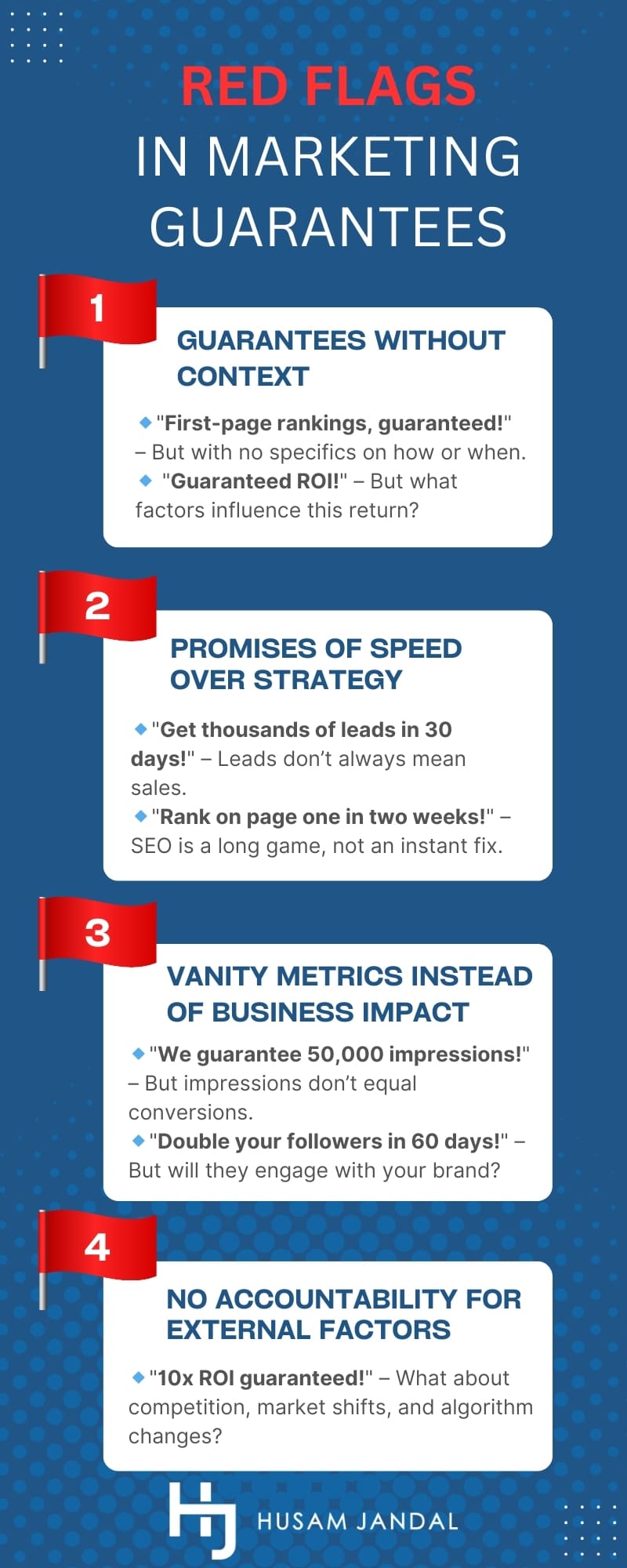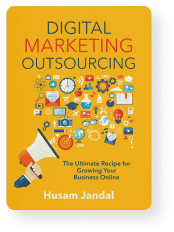 We’ve all heard the phrase, “If it seems too good to be true, it probably is.” This timeless wisdom holds true when it comes to marketing guarantees, too. But, if you’re not a marketing professional, it can be difficult to assess what kinds of results are realistic versus too good to be true. You’ll learn how to do that today.
We’ve all heard the phrase, “If it seems too good to be true, it probably is.” This timeless wisdom holds true when it comes to marketing guarantees, too. But, if you’re not a marketing professional, it can be difficult to assess what kinds of results are realistic versus too good to be true. You’ll learn how to do that today.
Marketing Guarantee Red Flags
Let’s start by covering some red flags. These are not necessarily deal-breakers every time, but they are signs that you should probe deeper to find out what they really mean and what they’re promising.
1. Guarantees Without Context
Marketing guarantees are meant to provide reassurance, but when they lack critical details, they can be misleading or outright deceptive. One of the biggest red flags is a guarantee without context; a marketing promise that sounds impressive but lacks the fine print that gives it real meaning.
What a Guarantee Without Context Looks Like
Some common examples include:
- “First-page rankings, guaranteed!”
- “We guarantee more leads!”
- “Guaranteed ROI!”
Why These Types of Marketing Guarantees Are Problematic
Phrases like these may sound ideal and even tied to real results, but they’re not airtight.
- They’re designed to sound good without committing to real results. A vague guarantee creates an illusion of certainty while allowing the provider to move the goalposts later. For example, a professional engaging in search engine optimization (SEO) might say they delivered “first-page rankings,” but if those rankings are for an irrelevant search term, they haven’t truly delivered value.
- They make it hard to hold the provider accountable. Without specifics, it’s nearly impossible to measure whether the guarantee was actually fulfilled. If a business expects revenue growth and the provider insists that increased traffic alone meets the guarantee, there’s no clear way to settle the dispute.
- They shift focus away from business outcomes. Marketing should drive measurable success, whether that’s revenue, customer acquisition, or brand positioning. Guarantees without context often focus on surface-level metrics that don’t actually impact business growth.
How to Spot a Guarantee Without Context
A reliable marketing guarantee should clearly define success by answering questions like:
- What specific result is being guaranteed? Not just “rankings” but rankings for high-value keywords.
- What timeframe is realistic? Results take time. Instant success is a red flag.
- What happens if the goal isn’t met? Is there a refund, strategy adjustment, or clear resolution plan?
If a guarantee sounds great but lacks clear details, it’s worth scrutinizing before signing any contracts.
2. Promises of Speed Over Strategy

Marketing takes time to work. While some strategies, like paid advertising, can generate quick wins, sustainable, meaningful growth requires careful planning and long-term execution. Yet, many marketing professionals try to ease concerns by offering guarantees based on speed rather than strategy.
What a Speed Over Strategy Promise Looks Like
Some common examples include:
- “Get thousands of leads in 30 days—guaranteed!”
- “Rank on page one in just two weeks!”
- “Double your revenue in 60 days!”
These statements may sound exciting, but fast doesn’t always mean effective.
Why These Types of Marketing Guarantees Are Problematic
- Marketing momentum takes time. SEO efforts, content marketing, and organic brand building don’t happen overnight. Even paid ad campaigns require testing and optimization before they yield sustainable results. If a provider guarantees instant success, they may be relying on short-term tricks that won’t hold up over time.
- Short-term gains don’t always mean business growth. Driving a flood of new traffic or leads in a short period doesn’t mean those leads are qualified prospects. In some cases, businesses end up paying for low-quality or irrelevant traffic that never converts into paying customers.
- Speed-focused guarantees often rely on manipulative tactics. To fulfill a quick-results guarantee, some agencies may use tactics like:
- Buying low-quality traffic or bot-generated leads.
- Running misleading ads to inflate engagement numbers.
- Over-promising results that can’t be sustained long-term.
A real marketing strategy prioritizes long-term business growth over quick wins. If a provider guarantees instant results without explaining the methodology behind them, it’s a sign to ask more questions.
How to Spot a Guarantee That Prioritizes Speed Over Strategy
- The guarantee emphasizes how fast results will come, not how they will be achieved. A marketing provider should be able to explain the steps they’ll take to reach your goals. If the focus is purely on timelines without a clear strategy, that’s a red flag.
- The promised results don’t align with industry norms. While marketing timelines vary, certain strategies, such as SEO and organic content growth, take months to show real impact. If a provider claims they can achieve significant results in an unrealistically short period, they may be relying on unsustainable tactics.
- There’s no mention of testing or optimization. Effective marketing requires continual adjustments based on data. A provider that guarantees immediate success without factoring in testing, refinement, and market conditions is likely using a one-size-fits-all approach rather than a true strategy.
If a guarantee prioritizes speed without a clear strategy behind it, it’s a red flag.
3. Guarantees Based on Vanity Metrics Instead of Business Impact

Marketing should drive business growth, but some guarantees focus on surface-level numbers that sound impressive without delivering real impact. If a guarantee is tied to metrics that don’t directly contribute to revenue, customer acquisition, or long-term success, it may not be as valuable as it seems.
What a Vanity Metric Guarantee Looks Like
Some common examples include:
- “We guarantee 50,000 impressions in your first campaign!”
- “Our strategy will double your social media followers in 60 days!”
- “Get 1,000 new website visitors per week—guaranteed!”
Why These Types of Marketing Guarantees Are Problematic
- Impressions and clicks don’t equal conversions. A high number of impressions means your content is being seen, but that doesn’t mean it’s reaching the right audience or leading to sales. If a guarantee focuses solely on visibility rather than engagement, it’s not a meaningful commitment.
- Social media growth doesn’t guarantee engagement. More followers might look impressive, but if they aren’t engaging with your brand or converting into customers, the number itself is meaningless. Some marketers even use bots or paid services to artificially inflate these figures.
- Traffic doesn’t always mean revenue. An increase in website visitors may seem like a positive outcome, but if those visitors aren’t potential buyers, they won’t contribute to business growth. A guarantee should focus on attracting the right audience rather than simply increasing traffic volume.
How to Spot a Guarantee Based on Vanity Metrics
- The guarantee focuses on numbers without explaining their impact. A provider should be able to demonstrate how the promised metrics will contribute to meaningful business outcomes. If they don’t, it’s a sign that the guarantee may be superficial.
- The metrics can be inflated without delivering real value. If a provider can easily achieve the guarantee through paid traffic, bots, or low-quality leads, it’s not a true measure of success. Look for guarantees that prioritize quality over quantity.
- There’s no connection between the guarantee and business goals. A marketing partner should align their guarantees with your company’s objectives. If the guarantee is purely focused on vanity metrics, it may not contribute to real growth.
If a guarantee prioritizes numbers that don’t drive business success, it’s a red flag.
4. No Accountability for External Factors
Marketing results don’t happen in a vacuum. A successful campaign depends on many external factors, including industry competition, economic conditions, and a business’s own internal processes. When a marketing provider guarantees results without acknowledging these outside influences, they are oversimplifying a complex process and avoiding accountability.
What a No-Accountability Guarantee Looks Like
Some common examples include:
- “We guarantee a 10x ROI on your ad spend!”
- “Your revenue will double in 90 days—guaranteed!”
- “We promise top-ranking SEO results, no matter what!”
Why These Types of Marketing Guarantees Are Problematic
- Marketing performance depends on variables beyond the provider’s control. Even the best marketing strategy can be impacted by changes in consumer behavior, market saturation, or industry shifts. A guarantee that doesn’t account for these factors is unrealistic.
- Internal business operations play a role in success. A marketing provider can drive high-quality leads, but if a business has weak sales processes, outdated pricing, or poor customer service, conversions may suffer. If a guarantee doesn’t acknowledge the client’s role in achieving success, it’s incomplete.
- Search engine and ad platform algorithms are unpredictable. SEO rankings fluctuate due to algorithm updates, and ad performance can change based on competition and bidding strategies. If a provider guarantees success without explaining how they adapt to these shifts, they may be making promises they can’t keep.
How to Spot a Guarantee That Ignores External Factors
- The provider makes absolute promises without considering market conditions. A credible marketing partner will acknowledge that results depend on factors like competition, demand, and seasonality.
- The guarantee assumes all businesses will see the same results. A one-size-fits-all promise is unrealistic because every industry and business model is different. A responsible provider will tailor expectations to each client’s situation.
- There’s no discussion of what happens if the guarantee isn’t met. A marketing partner should explain how they handle setbacks and whether there are adjustments, refunds, or strategy shifts in place. If they can’t answer this, the guarantee may be an empty promise.
If a guarantee ignores the role of external factors in marketing success, it’s a red flag.
Analyzing Real Marketing Guarantees
Now that we’ve covered common red flags, let’s take a closer look at real marketing guarantees to see how these warning signs play out in practice.
Claim 1: “Rank on the First Page in 15 days or We Pay $500”
Landing on the first page of Google is essential. Less than one percent of clicks go to results on the second page and beyond, Backlinko reports. So, when an SEO company promises a business they’ll get first-page rank within a couple of weeks of starting, people take notice. In this case, the guarantee is paired with a promise that the business will receive cash if the SEO company does not deliver. It sounds airtight, right?
Not exactly. This type of guarantee may seem risk-free at first glance, but when you break it down, the advantage still leans toward the agency. As we covered earlier, the SEO company only needs to get one of your keywords to the first page to have delivered on their promise. Moreover, the keyword doesn’t have to be relevant to what you do or even deliver traffic that’s ready to buy. It’s possible for the company to meet this goal and still not deliver value to your business.
Another key point here is that the average SEO agency charges over $3,000 per month, according to Ahrefs. That means even if they don’t meet this low threshold, they’re still coming out $2,500 ahead.
Claim 2: “Your First Month on Us – If You’re Not Thrilled, You Don’t Pay”
We’ve already broken down why vague guarantees can be misleading, but this agency pairs their promise with another tactic: offering the first month free.
It’s a compelling offer. On the surface, it seems like the agency is assuming all the risk. But, reputable professionals don’t typically work for free, especially during the onboarding phase. This is one of the most resource-intensive periods of a marketing engagement. A real marketing partner will spend this time learning about your business, defining a strategy, setting up ad accounts, and creating assets. These are all foundational steps that require major investments in expertise and time.
Yet, looking deeper, their website reveals that they don’t even begin marketing execution until around day 45. In other words, the “first month free” isn’t free work. It’s just onboarding.
This creates the illusion of risk-free services. In reality, they’re just easing clients into a contract. By the time marketing efforts begin in earnest, the business is already financially and psychologically invested. At that point, walking away doesn’t feel like an option.
Claim 3: “We Guarantee ROI”
This example comes from a general marketing agency as well. We covered a very similar claim earlier—ROI is a broad and subjective metric, making it difficult to hold the agency accountable. There’s no timeframe and no consequence if they don’t meet expectations.
However, this agency includes a detail in the fine print that shifts the narrative: They only accept clients if they can guarantee ROI.
At first glance, this might seem like a responsible approach. But in practice, it allows them to set the terms of success in their favor. By only working with businesses that are already primed for strong returns, they ensure they can fulfill their guarantee without necessarily adding value beyond what the company would have achieved anyway.
This type of claim can feel reassuring, but it’s important to consider what’s actually being promised. A guarantee should reflect the agency’s ability to drive results through strategy and execution, not just their ability to pick clients who are already in a position to succeed.
How to Vet Consultant Credibility

By now, you’ve seen how marketing guarantees can be misleading and how agencies can frame their offers in ways that sound appealing but don’t always deliver real value. But that doesn’t mean all marketing professionals are untrustworthy. There are skilled, ethical professionals who can deliver real results. The key is knowing how to separate them from those who rely on empty promises.
Look Beyond Case Studies and Testimonials
A strong track record means more than just success stories. Most marketers will showcase glowing testimonials and impressive case studies, but those alone don’t prove they can deliver similar results for your business.
- Are the case studies detailed? Do they explain the strategy behind the results, or do they only show before-and-after numbers without context?
- Do they highlight long-term success? A spike in traffic or leads for a few months doesn’t mean the strategy was sustainable. Look for evidence of long-term impact.
- Are the businesses they’ve helped similar to yours? A professional might have a great track record in e-commerce but little experience in B2B services.
If a marketing pro can’t provide specific details about how they achieved their results, or if all their testimonials are vague and generic, that’s a sign to dig deeper.
Assess Their Approach to Strategy
A reputable marketing partner will have a clear, adaptable strategy, not a cookie-cutter solution. Some marketers use prepackaged plans that sound great on paper but don’t account for your unique business, industry, or goals.
To vet their approach, ask:
- Do they take the time to understand your business? A credible consultant will ask detailed questions about your target audience, sales process, and past marketing efforts before making recommendations.
- Can they explain their strategy in plain terms? If they rely on buzzwords and vague claims without clearly explaining how they’ll drive results, they may not have a strong strategy at all.
- Do they offer a cookie-cutter package, or is their plan tailored? Every business has different needs. If an agency presents a preset package without discussing customization, they’re likely using the same playbook for every client.
A strong marketing consultant or agency will demonstrate expertise through their process, not just through flashy promises.
Examine Their Reporting and Transparency
Clear, consistent reporting is a sign of accountability. A trustworthy consultant will provide detailed insights into what’s working, what’s not, and how they’re adjusting strategies to improve results.
Look for:
- Regular updates with meaningful data. Reporting shouldn’t just be a list of vanity metrics. It should explain what the numbers mean and how they impact your business.
- Access to raw data. Some agencies filter what you see, only highlighting positive results. If they won’t grant access to full analytics or ad accounts, it’s a red flag.
- A plan for adjusting based on performance. Marketing isn’t static. A great consultant will analyze data, identify weaknesses, and refine the strategy rather than sticking to a rigid approach.
If a prospective partner is hesitant to share detailed reports or only provides surface-level updates, they may be hiding poor performance.
Understand Their Pricing Model and Contracts
How a consultant handles pricing can reveal a lot about their priorities. Some models align with performance, while others lock businesses into contracts with little accountability.
Be cautious of:
- Long-term contracts with no flexibility. A reputable consultant should earn your business through results, not force you into a lengthy commitment with no clear exit. While it’s normal to have some kind of minimum engagement, you should have options if you discover the relationship isn’t working out.
- Hidden fees or unclear deliverables. Some marketers charge low upfront fees but include costly add-ons later. Ensure you understand the scope of work and what you can expect in return for your investment.
- Pay-for-performance models that seem too good to be true. While these can work in some cases, they often come with fine print that favors the agency more than the client.
A transparent pricing model should outline what’s included, how success is measured, and what happens if goals aren’t met. If the contract feels one-sided, it probably is.
Questions to Ask Before Hiring
Once you’ve identified a potential marketing partner, asking the right questions can help you determine whether they’re a good fit. Here are some key questions to include in your evaluation process.
How Do You Determine the Best Strategy for My Business?
A credible consultant will start by understanding your unique goals and challenges rather than offering a one-size-fits-all approach.
Can You Walk Me Through a Real Example of How You’ve Helped a Business Like Mine?
Case studies are common but look for specifics on strategy, challenges, and long-term results.
How Do You Define Success for Your Clients?
If their answer focuses only on vanity metrics like impressions and clicks, that’s a red flag.
What Happens If We Don’t See the Expected Results?
A reputable consultant should explain how they adjust strategies, not just make excuses.
What Kind of Reporting Will I Receive, And How Often?
Transparency matters. Look for a consultant that provides detailed insights, not just surface-level numbers.
Do I own my marketing assets, ad accounts, and data?
If a marketing provider controls these, leaving them could mean losing everything they built.
What’s included in your pricing, and are there any additional fees?
Ensure you understand exactly what’s covered and avoid vague pricing structures.
How to Build a Partnership with a Results-Driven Consultant
Hiring the right marketing consultant is just the first step. How you work with them plays a major role in whether you see real results.
Set the Foundation: Work with Your Consultant to Define Success
Many marketers expect businesses to come in with clear objectives. If you tell them you want “more traffic,” they’ll build a campaign to get you more traffic. If you say you want “better brand awareness,” they’ll run ads and boost social engagement. But more of something isn’t always better, and numbers alone don’t translate into business success.
This is where the right consultant makes all the difference. Instead of jumping straight into execution, a good consultant will take a step back and ask:
- What does success actually look like for your business? More customers? Higher retention? Entering a new market?
- What challenges are holding you back? Low-quality leads? High customer acquisition costs? Website visitors that don’t convert?
- What’s the real business goal behind your marketing efforts? More revenue? Lower churn? Increased lifetime customer value?
Give Your Consultant the Information They Need to Succeed
Even the best consultant can only work with the resources they have. For them to develop an effective strategy, they need access to the right data and people within your business. The more they understand about your company, customers, and marketing history, the better they can tailor their approach.
Make sure your consultant has access to:
- Website analytics to track traffic, conversions, and customer behavior.
- Ad accounts if they’re managing PPC or paid social campaigns.
- Sales and customer data to refine targeting and messaging.
- Key decision-makers to ensure approvals don’t slow down progress.
Commit to Regular Check-ins and Communication
A strong consultant relationship thrives on consistent and open communication, so strategies stay aligned with your business goals. Regular check-ins ensure both sides stay on track.
To maximize your consultant’s impact:
- Set a consistent meeting schedule. Weekly or biweekly check-ins keep the strategy agile and responsive.
- Review reports together. Don’t just receive updates—discuss what the numbers mean and what adjustments are needed.
- Be available for feedback and approvals. Delays in decision-making can slow down execution and impact results.
Be Open to Strategy Adjustments
Marketing is never static. What worked last year or even last month may not work today. A great consultant will continuously analyze performance and refine strategies to maximize results.
To make the most of your consultant’s expertise:
- Expect to test and optimize. Marketing success comes from ongoing refinement. If you aren’t testing new things and sometimes failing, you can’t be sure that you’re achieving the best possible results.
- Trust performance data over assumptions. If analytics show a pivot is needed, be open to making changes.
- Be willing to shift budget when necessary. If one channel underperforms while another exceeds expectations, reallocating resources can improve ROI.
Get the Full Story for Your Business
I don’t believe in sweeping guarantees. Real marketing success isn’t one-size-fits-all. With years of experience working with both Fortune 100 companies and small businesses, I know that every business has unique challenges and goals. While I follow a proven recipe for digital marketing success, every strategy is tailored to the business I’m serving. If you’re ready to take a more strategic approach to marketing, let’s start a conversation.
FAQs on Marketing Guarantees
Can a marketing guarantee help me achieve my marketing goals?
Not necessarily. A guarantee may focus on short-term wins, like traffic increases or ad clicks, rather than meaningful business growth. Instead of looking for guarantees, work with a consultant who prioritizes long-term marketing goals tied to revenue, customer acquisition, and ROI.
Why is reporting transparency important when evaluating a marketing guarantee?
A guarantee is meaningless if you can’t track progress accurately. Some providers only report on vanity metrics, making it difficult to assess real impact. A reputable consultant will offer reporting transparency with clear data on conversions, ROI, and long-term growth.
Are all marketing promises misleading?
Not all guarantees are deceptive, but many are crafted in a way that benefits the provider more than the client. Ethical consultants focus on strategy, adaptability, and accountability rather than absolute promises.
What should a legitimate marketing guarantee include?
A credible guarantee should:
- Define specific, measurable outcomes
- Set a realistic timeframe
- Clarify conditions for success
- Explain what happens if the goal isn’t met
If these elements are missing, the guarantee may not hold much value.
Should I choose a marketing consultant based on their guarantees?
No. Guarantees may sound appealing, but the best consultants focus on data-driven strategies, clear communication, and long-term business impact rather than making promises they can’t control.
Why do agencies and consultants offer guarantees if results aren’t guaranteed?
Marketing providers use guarantees as a sales tactic to reduce hesitation and make their services seem risk-free. However, many guarantees are structured to favor the provider, ensuring they can meet their promise without delivering true value.
How can I hold a marketing consultant accountable without a guarantee?
Rather than relying on guarantees, focus on:
- Clear goal-setting before work begins
- Regular performance reviews
- Transparent reporting and data access
- A structured process for strategy adjustments
A good consultant will welcome accountability based on results, not gimmicks.
What questions should I ask before committing to a marketing guarantee?
Before agreeing to a guarantee, ask:
- What specific results are guaranteed?
- How is success measured?
- What conditions must be met for the guarantee to apply?
- What happens if the goal isn’t met?
- How is performance tracked and reported?
If the provider can’t answer these questions clearly, the guarantee is likely a red flag.





































































